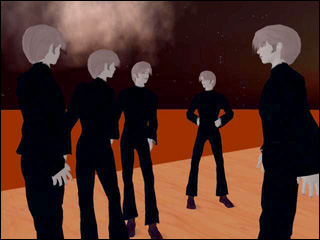Metaverse Talk at TexElectronica
 I will be giving a talk on the emerging metaverse, art, and related topics this Saturday afternoon at the Modern Art Museum of Fort Worth. I'll be previewing the upcoming art show on the ATEC Second Life Island. The talk is part of the TexElectronica New Media Art event hosted by UNT. Tom Linehan and Frank Dufour from UTD are also scheduled at the event.
I will be giving a talk on the emerging metaverse, art, and related topics this Saturday afternoon at the Modern Art Museum of Fort Worth. I'll be previewing the upcoming art show on the ATEC Second Life Island. The talk is part of the TexElectronica New Media Art event hosted by UNT. Tom Linehan and Frank Dufour from UTD are also scheduled at the event.
The Dark Side of Social Networks
So you are in college and looking for a good gig. What do you do in the age of GooTube? You make a video of course. And you claim you can serve a tennis ball 140 mph and bench press 495 pounds. Wait, no, maybe you shouldn't do that.
Actually I don't think Yale student Aleksey Vayner knew he was living in the age of web 2.0 and GooTube - his video was part of a supposedly confidential application to UBS for an investment banking job. If your video is digital, you should assume everyone will see it, at least until we have better permission layers on Internet media.
Social networks can connect you and make you popular, but they can also bring you 15 minutes of shame.
UTD EMAC Site Up
The new EMAC Site is up. Just a default template for now but I've been pretty good about posting there in the past week or so - mostly for the UTD Arts & Technology community but anyone who reads this blog will probably find it interesting.
It's mostly quick bits of things with sprinklings of commentary. The site is a group effort and there are several grad students contributing. EMAC stands for Emerging Media & Communication and is the new area I started this year inside the Arts & Technology program at the University of Texas and, happily, it's really taking off.
The Metaverse: Beyond Games - Notes from the Austin Games Conference

Last week I was at the Austin Game Conference, and, other than my own presentation,
pretty much missed everything. Some have asked for my slides from the talk,
so here
they are. There are many notes and anecdotes missing, but you should
be able to glean something from it. I'll be turning it into an article / chapter
(s) in the coming months and publish the updates here.
I may not have attended many of the talks, but I did have spies. Other UTD
Virtual Worlds Lab folks were there and they gave me reports on many of the
panels. One interesting thread was the "metaverse" talk which I've
been tracking for some time now. Much of it, granted, is already starting to
sound hype-filled, but there are important ideas to discuss. There are competing
visions about how the metaverse will evolve (if at all).
One idea that I think
deserves to be deflated is that, by some magic transformation, the game industry
itself will create an extensible 3D universe that moves beyond games and connects
a diverse set of 3D worlds. I have doubts that, in any conscious manner, that
this will be the case. The game developers have enough problems creating new
games that will compete in a very tight marketplace. And, with a few
exeptions,
they get pretty uncomfortable once the talk begins to move beyond games. The
talk about casual games, serious games, and the ill-defined metaverse were
efforts to expand the space but stay with in their comfort zone.
My bet is that the extensible, user generated 3D worlds that move beyond
games will come from outside the game industry and more importantly, they
will eventually eclipse it.
In several sessions the WOW vs MySpace stat came up: 1 million US WOW players
vs 110+ million MySpace users. One of the points that Monica Evans and I were
trying to make is that MMORPG games need to take much more seriously the social
aspects. Monica, who is a pHD candidate at UT Dallas, argued that the social
space that exists within and around the game is actually the most important
aspect. I argued, among other things, that game developers need to take look
at the web 2.0 social network space for ideas about how to create tools for
community building. They are very different ways of producing, however. Games
are top down productions where all the content is created by the game company.
Social Networks are made up of a set of tools that enable participants to create
their own content. One designs the experience and the other designs the tools
that allow people to create their own experiences. In the 3D space, Second
Life is the best know example of this.
Once you leave the confines of game worlds and game related interactions the
conventions for new forms of navigating and communicating are non-existent.
In game worlds you can model whatever world you are emulating: fantasy, sci-fi,
etc. When you move in to 3D spaces for other purposes - an "art gallery" or
"office space" for example - basically the only option is to fall
back on real world examples. And that's where not only the whole thing falls
on its face, but also where the opportunity lies.
The opportunity is to create new kinds of worlds that vary from imaginative
creations beyond the narrow game genres to very practical spaces that extend
and even create new areas of the economy.
The problem is that no one seems to be leading the charge. Some new, consumer
oriented tools would help. What we have now are game development
tools, Second Life and a few other similar worlds, and Multiverse. These
are developer and early adopter tools. My second bet, as I presented in my
talk, is that the "multiverse" will
develop out of lots and lots of small, individually created and interconnected
social worlds, rather than from the expansion and connecting of larger, game-like
worlds.
What
we don't have yet are simple tools that allow individuals and groups to create
these stand alone worlds. For lack of a better name I call it "iWorld" in
reference to the Apple suite of software that is so easy to use. That is the
way it needs to work. What iMovie is to Final Cut, iWorld would be to the current
crop of developer tools (even though they are a far cry from the maturity and
elegance of Final Cut Pro). I should be able to create a virtual room, put
stuff in it, and invite friends over. Then I should be able to connect it to
other rooms and larger spaces.
Games take social interaction as
a secondary consideration. And you really can't blame them: creating a good game
is very hard. But they just need to talk to their own, most ardent fans to
find out just what's missing. That's just what I did several months ago in
Atlanta at the FanFaire for Sony's Everquest and other properties. What I
learned is that without exception among the thirty or so interviews and discussions
I had, that the social connection was more important than the game.
The players loved the game, but they really needed the connection
to other people. This need is the very serious part of game worlds, and game
companies are not well equipped to deal with it. It's not their area of expertise.
I came away from
the FanFaire event a bit sad. I met several people who had driven alone from
hundreds of miles away to meet fellow gamers. The longing for friendship and
connection in the real world was palpable. In this context, among like-minded
peers, they were comfortable, and it felt like an instant community was formed
during those three days. After it was over they went back to using Everquest
as a social network, even though it is not intended or optimized for this purpose.
The sadness left me thinking that these people need something better. And what
about the much, much larger group that is not interested in the fantasy and
sci-fi worlds the game industry offers? I think they also need 3d social worlds.
Where are they? Second Life is a start, but it has serious flaws that will
keep it from becoming the model for the metaverse (economic
model, a single map, private ownership & governance, a dedication to emulating
reality, etc.) More on this later.
I think it is highly unlikely that the metaverse will emerge from the gaming
world. An expanded 3D world
will more likely emerge from Internet developers who look look to games for
inspiration in the areas of real time interaction and immersive 3D space. There
are interim steps to be made, however. I'll leave that to your imagination...